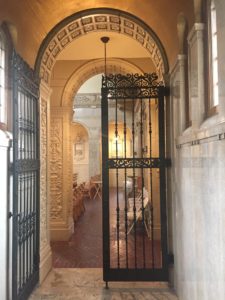In the 29th chapter of her Life, about halfway through it, Saint Teresa writes:
I saw in the hands of this beautiful cherubim angel a large golden dart and at the end of the iron tip there appeared to be a little fire. It seemed to me this angel plunged the dart several times into my heart that it reached deep within me [in Spanish she says, “it reached into my entrañas”]. When he drew it out, I thought he was carrying off with him the deepest part of me; and he left me all on fire with great love of God. The pain was so great that it made me moan, and the sweetness this greatest pain caused me was so superabundant that there is no desire capable of taking it away; nor is the soul content with less than God. The pain is not bodily but spiritual, although the body doesn’t fail to share in some of it, and even a great deal. The loving exchange that takes place between the soul and God is so sweet that I beg him in his goodness to give a taste of this love to anyone who thinks I am lying.
She received a special grace, which is typical of what Saint Teresa refers to as the sixth mansion; it is a very extraordinary gift that God gives to very rare souls. But other people have experienced this…Saint John of the Cross, Saint Therese, Saint Mary of Jesus Crucified, and Saint Padre Pio, to name a few.
The the entrañas… What is that depth of her being that was touched so intimately by God? Saint John of the Cross describes the entrañas as the intimate center of the substance of the soul.. Saint John of Cross says that God’s purpose in granting this kind of deep communication of Himself to someone else’s depth ‘is to exalt the soul, to enlarge it, and enrich it.’
Saint Teresa’s mystical experience must not be confused with mysticism, as it is popularly known on the level of cultural or television mysticism. On that secular level, mysticism is often associated as a grandiose or paranormal psychic adventure, and that’s not the point of this experience at all.
For our holy mother, Saint Teresa, authentic mysticism always had an ecclesial dimension, in other words, genuine mysticism always involved mission for others; it wasn’t just for herself.
One of our Carmelite opening prayers expresses this aspect of mysticism leading to mission. ‘Almighty God, you filled the heart of Saint Teresa, our mother, with the fire of your love and gave her strength to undertake difficult tasks for the honor of your name.’
This is really important because Saint Teresa experienced the Transverberation before all of the marvels of her foundations…and before all that God did through her. In a way that is typical of her voice and expression, Saint Teresa says about her mission in Carmel:
‘If our Lord hadn’t granted me the favors he did, it doesn’t seem to me that I would have had the courage for the works that were done or the strength to support the trials suffered and the statements and judgments made against me. So after the foundations were begun, the fears I previously had in thinking that I was deceived, left me. I grew certain the work was God’s and so I threw myself into difficult tasks, although always with advice and under obedience. As a result, I understand that since our Lord desire to revive the original spirit of this order, and in His mercy he took me as a means, His majesty had to provide me with what I was lacking, which was everything, in order to get results and better manifest His greatest through so wretched a thing’ (referring to herself).
This grace was a catalyst, a turning point in her life, just like the Transfiguration was to the Apostles. The mystical experience that the three Apostles had on Mount Tabor of seeing Jesus transfigured, left a special mark on their souls and it prepared them for their mission…but more so, it prepared them to endure the crisis of the Cross before they were endowed and equipped for their mission. It was a special turning point.
In the life of Saint Teresa, Allison Peers writes, “At the time of the Transverberation, though she could not have known it, she was nearing the end of the quarter century during which she had been an obscure daughter of Carmel, and she was standing on the threshold of the lifework which was to make her be immortal.”
The Transfiguration in the lives of the Apostles, and the Transverberation in the life of Saint Teresa, show that God communicates Himself in times that we need Him most, and in the times that we need it most. An authentic relationship with God is always going to have an impact on our relationships with others. God’s grace, in granting us an extraordinary experience of His love, is always…that we may have an extraordinary love for others and be willing to share in His mission for the salvation of souls.
In conclusion, to use one Mass Offertory Prayer, ‘Lord God, we offer you this victim of charity, may He kindle in us a love as intense as that which let Saint Teresa of Ávila to offer herself a living sacrifice for the Church.’
May we, like our holy mother, Teresa, have a generous, determined, and courageous spirit to endure all things for Christ who strengthens us…that we may be filled with the infinite fire of His divine love!

